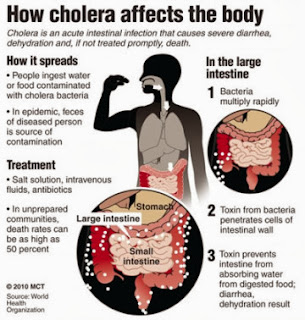
The most important things to remember when traveling abroad are to avoid eating uncooked food and drinking untreated water. The disease is more prevalent in developing countries with inadequate sanitation and water supplies, and it affects people in crowded areas. For this reason, it is important to follow certain precautions when you’re abroad. Here are some ways to prevent getting ill from cholera. First, avoid drinking and eating undercooked and raw seafood.
The most important aspect of cholera treatment is to replace the fluids and salts lost through diarrhea and vomiting. Often, this is done with a WHO-developed rehydration solution, or ORS. It is a powder that you mix with clean water and is meant to replace all the fluids and salts in your body. In severe cases, you may need to receive intravenous fluid replacement, and you may also be prescribed antibiotics.
Another important factor when addressing cholera treatment is sanitation and hygiene. These two factors work hand in hand. While sanitary conditions are often excellent, they can’t be relied upon in poorer areas. Luckily, there are treatments for cholera that will help prevent it from causing harm. It is possible to get the disease by eating certain types of seafood, so it’s important to keep these in mind when traveling abroad.
The primary treatment for cholera is rehydration. Patients need to drink plenty of water and eat food that has been undercooked or raw. This will help replenish lost fluids and electrolytes. ORS comes in powder form, and you can mix it with one liter of water. If the illness is severe, you’ll need to administer a liquid diet to regain electrolytes. If the diarrhea is severe, you’ll likely need to take antibiotics to prevent the spread of the disease.
Although the symptoms of cholera vary from person to person, they all share common symptoms. Acute watery diarrhea is the most common symptom. Diarrhea can be bloody or bloodless and can be caused by several different types of bacteria, viruses, and parasites. If you are not sure what causes cholera, you can see a doctor and get tested. The site https://vietlifemedical.com/
recommends staying away from contaminated water and food.
Cholera vaccines are not a substitute for good sanitation and hygiene. However, the vaccine could prevent two-thirds of cholera cases. What’s more, the vaccine works for two years before symptoms appear. When a person is vaccinated, they don’t have to worry about recurring symptoms. Instead, they can focus on preventing recurrent infections and eating healthy.
If you are ill with cholera, it is important to wash your hands frequently. Using soap or alcohol-based hand sanitizers can help you avoid the infection. If you’re exposed to contaminated water, make sure you use bottled water or chemically treated water to wash your food and dishes. You should also avoid eating shellfish, because the bacteria that causes cholera is found in raw meat.
The disease is spread by contaminated water and food. In developing countries, cholera is more common than in developed countries. It isn’t transmitted from person to person, but can be passed through contaminated water. The symptoms of cholera are dehydration, and a high risk of death. They may appear after a few hours or for five days after a contaminated meal. They will usually appear within a day of eating contaminated food or drinking contaminated water.
After a cholera infection, the main treatment is rehydration. The body will not be able to recover unless it has a lack of fluids. The body will need to replenish the fluids it loses through diarrhea, but the main aim is to maintain normal body fluids. If you’re unable to drink water, you’ll need to consume ORS orally. If you don’t drink ORS, you’ll need to use a solution that contains the salts to replace the salts.
Besides water, cholera sufferers should drink lemon juice. It’s an effective remedy for the symptoms of cholera. Its vitamin C content makes it an excellent choice for treating the disease. While lemons aren’t a cure for cholera, they can reduce the risk of severe symptoms. If you’re not able to drink lemon juice, you can also try drinking coconut water. During the early stages of the infection, the first symptoms include vomiting and watery diarrhea. The disease can even lead to dehydration and cause excessive thirst.
About the author